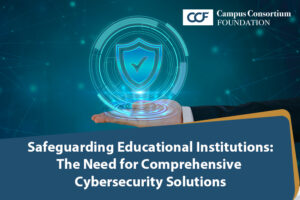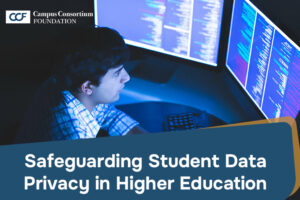As the landscape of higher education continues to evolve, the integration of artificial intelligence (AI) has become increasingly prominent. While chatbots have garnered attention for their ability to enhance student services, the true potential of AI lies in its capacity to create hyper-personalized learning experiences. This blog explores how generative AI is transforming curriculum design, tutoring, and career counseling in higher education institutions. Additionally, we will address the ethical concerns surrounding AI, such as bias and plagiarism, and highlight how Campus Consortium Foundation (CCF) promotes responsible AI adoption.
The Transformative Power of Generative AI
Generative AI refers to algorithms that can create new content, whether text, images, or even music, based on existing data. In the context of education, this technology is being harnessed to tailor learning experiences to individual student needs, preferences, and learning styles. Here’s how generative AI is making waves in curriculum design, tutoring, and career counseling:
- Curriculum Design: AI can analyze vast amounts of data from student performance, engagement metrics, and industry trends to inform curriculum development. By identifying gaps in knowledge and skills, educators can create dynamic curricula that are responsive to student needs and workforce demands. This results in a more engaging and relevant educational experience that prepares students for real-world challenges.
- Tutoring: AI-driven tutoring platforms provide personalized support to students, adapting to their learning pace and style. For instance, generative AI can offer tailored practice problems, feedback, and resources based on individual performance. This level of customization helps students grasp complex concepts more effectively, ultimately leading to improved academic outcomes.
- Career Counseling: Generative AI is revolutionizing career services by analyzing students’ skills, interests, and market trends to provide personalized career guidance. AI can suggest potential career paths, recommend relevant internships, and even help students develop resumes and cover letters tailored to specific job opportunities. This empowers students to make informed decisions about their futures.
Ethical Concerns in AI Adoption
While the benefits of AI in education are significant, technology also raises ethical concerns that must be addressed to ensure responsible adoption. Two major issues are:
- Bias: AI systems can inadvertently perpetuate existing biases present in the data they are trained on. This can lead to unfair treatment of certain groups of students and reinforce stereotypes. It is crucial for institutions to implement AI solutions that are regularly audited and refined to mitigate bias and promote equity in education.
- Plagiarism: As generative AI becomes more sophisticated, the risk of students using AI-generated content without proper attribution increases. This raises questions about academic integrity and the value of original thought. Educational institutions must establish clear guidelines on the ethical use of AI tools and educate students about responsible practices.
CCF’s Commitment to Responsible AI Adoption
At Campus Consortium Foundation (CCF), we recognize the transformative potential of AI in higher education and are committed to promoting responsible adoption. We advocate for the development of ethical AI practices that prioritize equity, transparency, and accountability. By fostering a culture of responsible AI use, we aim to empower institutions to leverage technology effectively while maintaining the integrity of educational experience.




